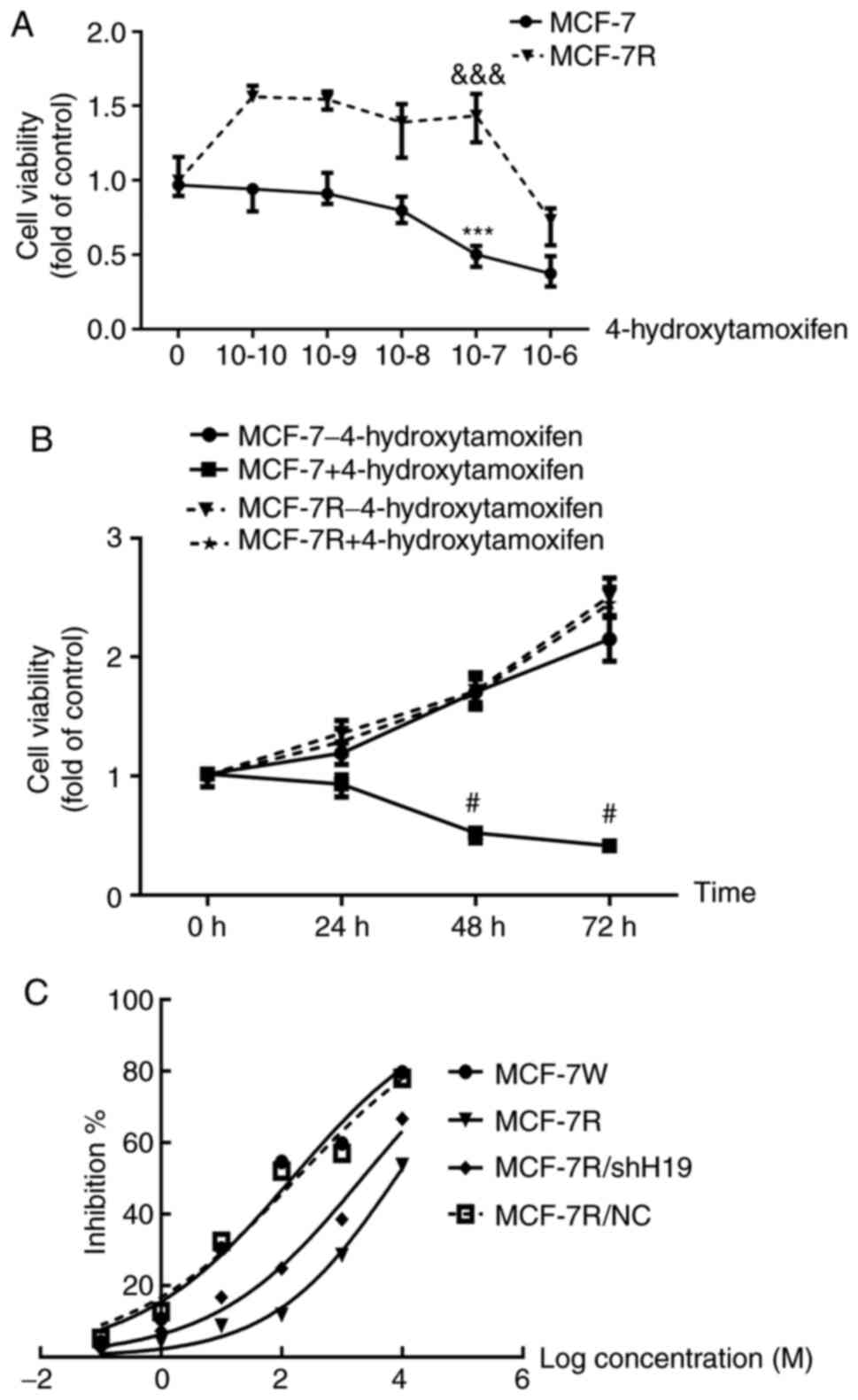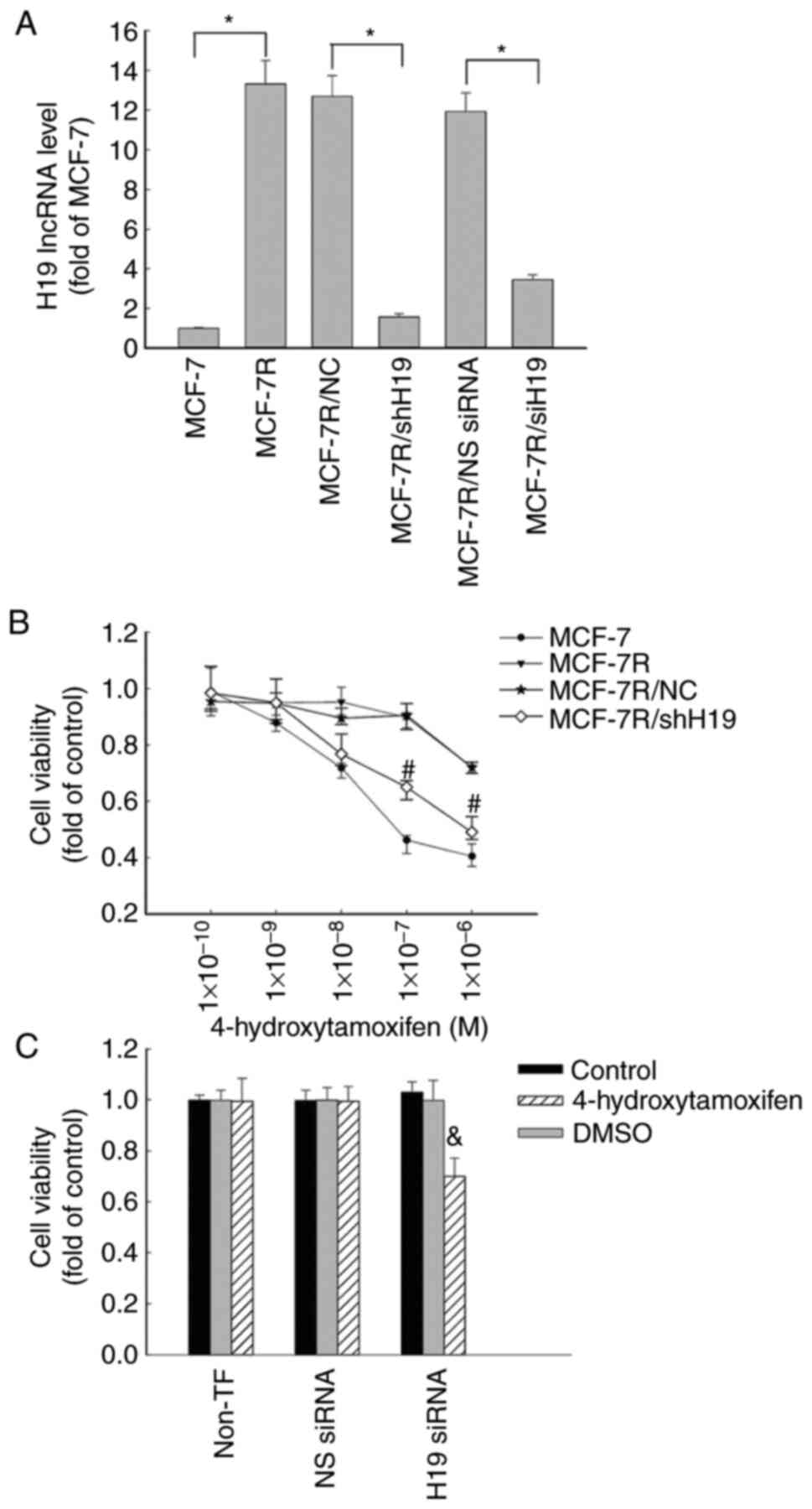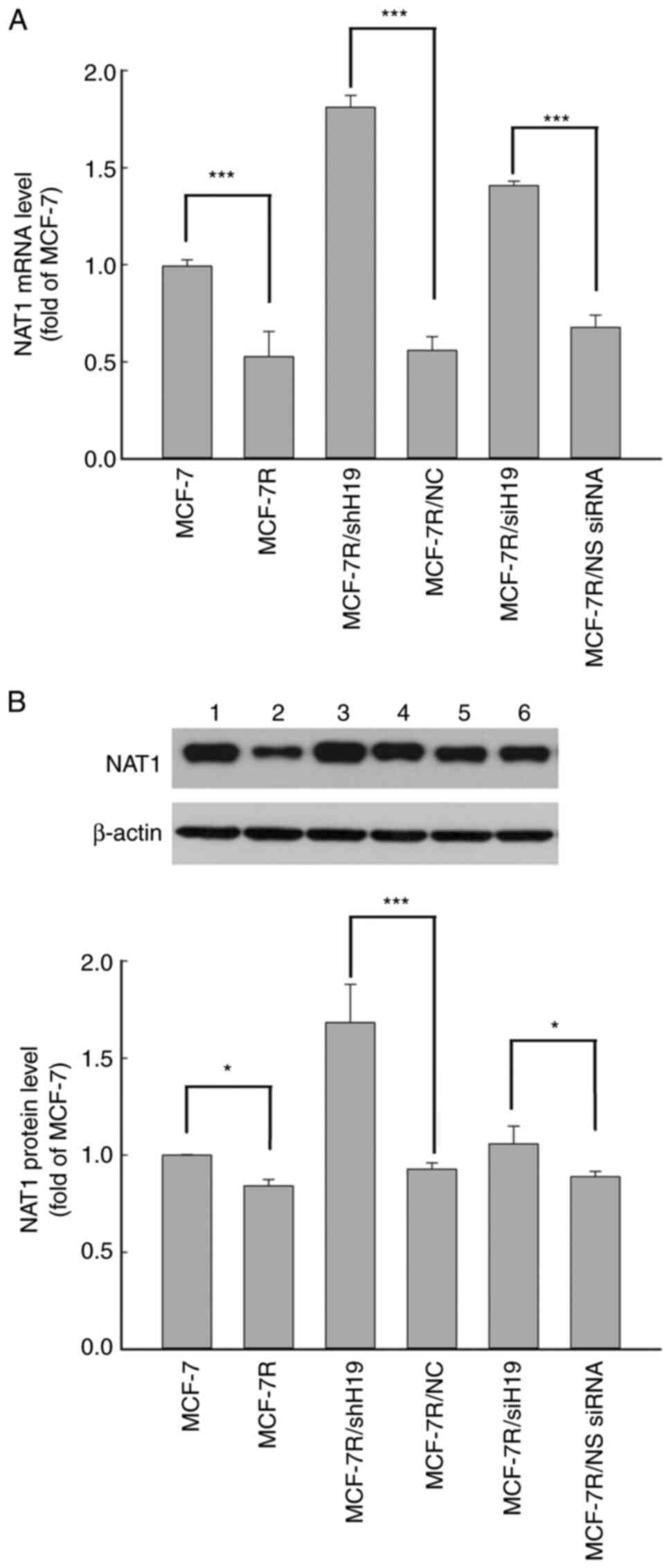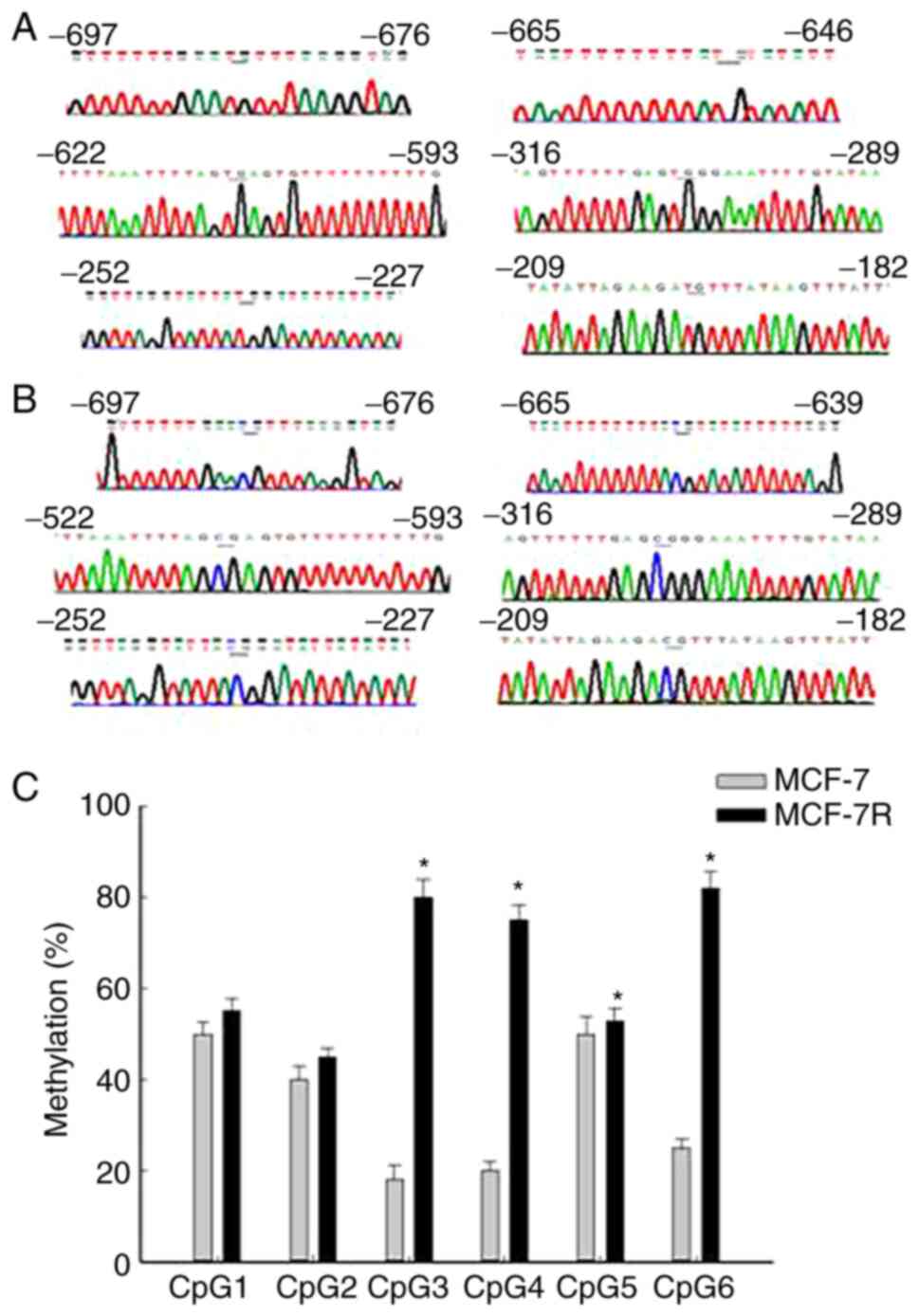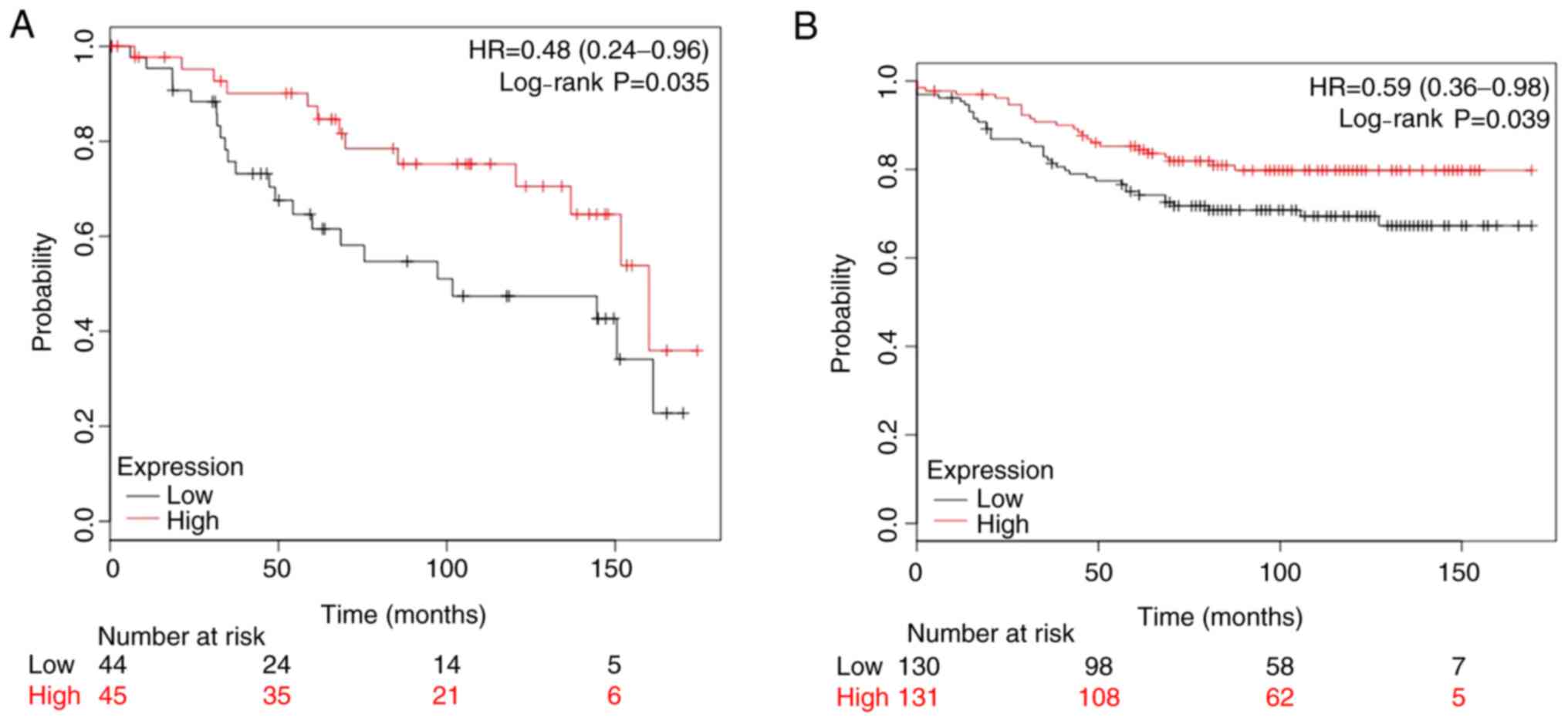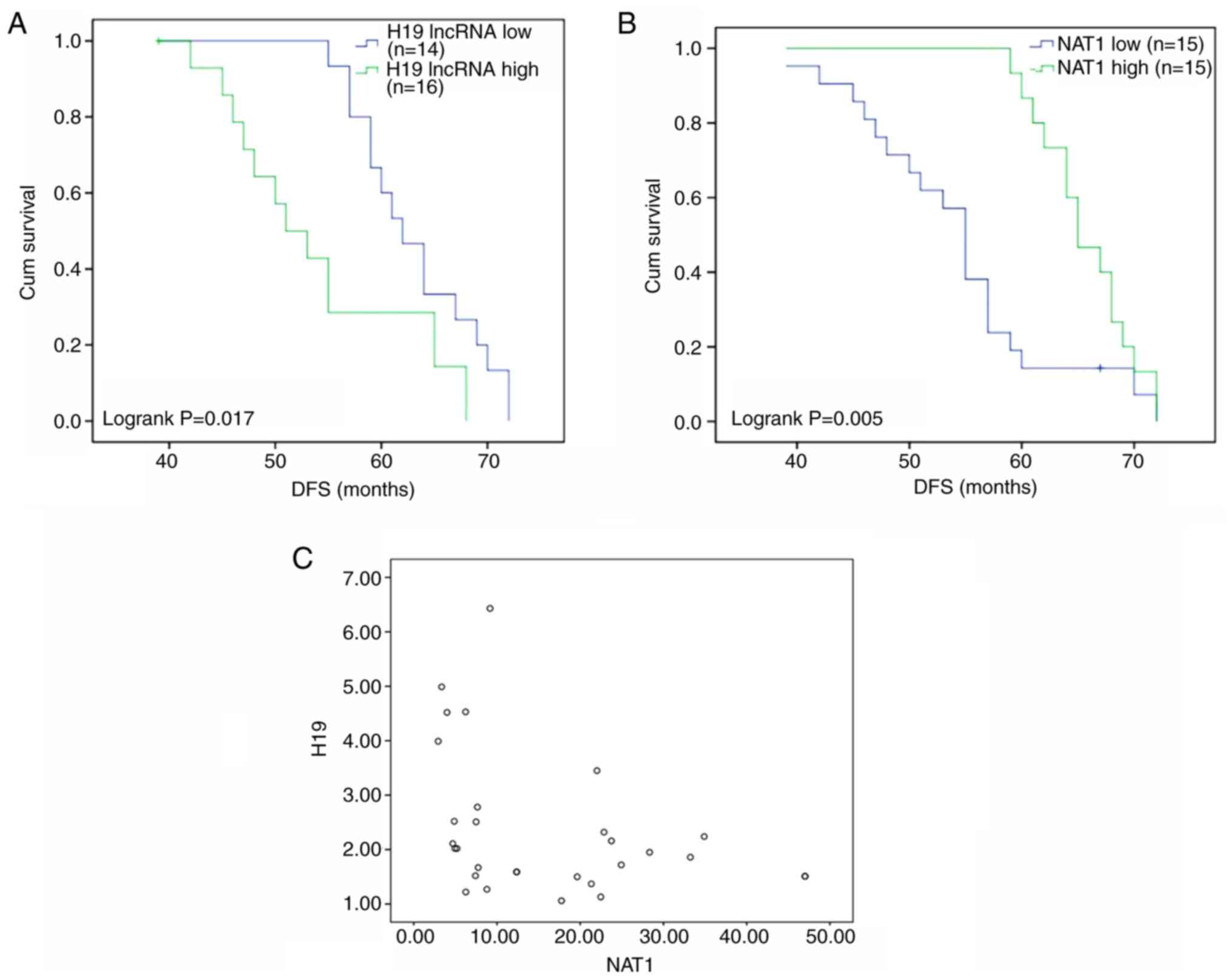|
1
|
Bray F, Ferlay J, Soerjomataram I, Siegel
RL, Torre LA and Jemal A: Global cancer statistics 2018: GLOBOCAN
estimates of incidence and mortality worldwide for 36 cancers in
185 countries. CA Cancer J Clin. 68:394–424. 2018.PubMed/NCBI View Article : Google Scholar
|
|
2
|
Harvey JM, Clark GM, Osborne CK and Allred
DC: Estrogen receptor status by immunohistochemistry is superior to
the ligand-binding assay for predicting response to adjuvant
endocrine therapy in breast cancer. J Clin Oncol. 17:1474–1481.
1999.PubMed/NCBI View Article : Google Scholar
|
|
3
|
Drăgănescu M and Carmocan C: Hormone
therapy in breast cancer. Chirurgia (Bucur). 112:413–417.
2017.PubMed/NCBI View Article : Google Scholar
|
|
4
|
Ring A and Dowsett M: Mechanisms of
tamoxifen resistance. Endocr Relat Cancer. 11:643–658.
2014.PubMed/NCBI View Article : Google Scholar
|
|
5
|
Abdel-Hafiz HA: Epigenetic mechanisms of
tamoxifen resistance in luminal breast cancer. Diseases.
5(16)2017.PubMed/NCBI View Article : Google Scholar
|
|
6
|
Lo PK and Sukumar S: Epigenomics and
breast cancer. Pharmacogenomics. 9:1789–1902. 2008.PubMed/NCBI View Article : Google Scholar
|
|
7
|
Kim SJ, Kang HS, Chang HL, Jung YC, Sim
HB, Lee KS, Ro J and Lee ES: Promoter hypomethylation of the
N-acetyltransferase 1 gene in breast cancer. Oncol Rep. 19:663–668.
2008.PubMed/NCBI
|
|
8
|
Kim SJ, Kang HS, Jung SY, Min SY, Lee S,
Kim SW, Kwon Y, Lee KS, Shin KH and Ro J: Methylation patterns of
genes coding for drug-metabolizing enzymes in tamoxifen-resistant
breast cancer tissues. J Mol Med (Berl). 88:1123–1131.
2010.PubMed/NCBI View Article : Google Scholar
|
|
9
|
Berteaux N, Lottin S, Monté D, Pinte S,
Quatannens B, Coll J, Hondermarck H, Curgy JJ, Dugimont T and
Adriaenssens E: H19 mRNA-like noncoding RNA promotes breast cancer
cell proliferation through positive control by E2F1. J Biol Chem.
280:29625–29636. 2015.PubMed/NCBI View Article : Google Scholar
|
|
10
|
Sun H, Wang G, Peng Y, Zeng Y, Zhu QN, Li
TL, Cai JQ, Zhou HH and Zhu YS: H19 lncRNA mediates
17β-estradiol-induced cell proliferation in MCF-7 breast cancer
cells. Oncol Rep. 33:3045–3052. 2015.PubMed/NCBI View Article : Google Scholar
|
|
11
|
Adriaenssens E, Lottin S, Dugimont T,
Fauquette W, Coll J, Dupouy JP, Boilly B and Curgy JJ: Steroid
hormones modulate H19 gene expression in both mammary gland and
uterus. Oncogene. 18:4460–4473. 1999.PubMed/NCBI View Article : Google Scholar
|
|
12
|
Gao H, Hao G, Sun Y, Li L and Wang Y: Long
noncoding RNA H19 mediated the chemosensitivity of breast cancer
cells via Wnt pathway and EMT process. Onco Targets Ther.
11:8001–8012. 2018.PubMed/NCBI View Article : Google Scholar
|
|
13
|
Basak P, Chatterjee S, Bhat V, Su A, Jin
H, Lee-Wing V, Liu Q, Hu P, Murphy LC and Raouf A: Long non-coding
RNA H19 acts as an estrogen receptor modulator that is required for
endocrine therapy resistance in ER+ breast cancer cells. Cell
Physiol Biochem. 51:1518–1532. 2018.PubMed/NCBI View Article : Google Scholar
|
|
14
|
Tsang WP and Kwok TT: Riboregulator H19
induction of MDR1-associated drug resistance in human
hepatocellular carcinoma cells. Oncogene. 26:4877–4881.
2007.PubMed/NCBI View Article : Google Scholar
|
|
15
|
Coser KR, Wittner BS, Rosenthal NF,
Collins SC, Melas A, Smith SL, Mahoney CJ, Shioda K, Isselbacher
KJ, Ramaswamy S and Shioda T: Antiestrogen-resistant subclones of
MCF-7 human breast cancer cells are derived from a common
monoclonal drug-resistant progenitor. Proc Natl Acad Sci USA.
106:14536–14541. 2009.PubMed/NCBI View Article : Google Scholar
|
|
16
|
Livak KJ and Schmittgen TD: Analysis of
relative gene expression data using real-time quantitative PCR and
the 2(-Delta Delta C(T)) method. Methods. 25:402–408.
2001.PubMed/NCBI View Article : Google Scholar
|
|
17
|
Butcher NJ, Ilett KF and Minchin RF:
Substrate-dependent regulation of human Arylamine
N-Acetyltransferase-1 in cultured cells. Mol Pharmacol. 57:468–473.
2000.PubMed/NCBI View Article : Google Scholar
|
|
18
|
Froger A and Hall JE: Transformation of
plasmid DNA into E. coli using the heat shock method. J Vis Exp:
Aug 1, 2007 (Epub ahead of print). doi: 10.3791/253.
|
|
19
|
Reed K, Hembruff SL, Laberge ML,
Villeneuve DJ, Côté GB and Parissenti AM: Hypermethylation of the
ABCB1 downstream gene promoter accompanies ABCB1 gene amplification
and increased expression in docetaxel-resistant MCF-7 breast tumor
cells. Epigenetics. 3:270–280. 2008.PubMed/NCBI View Article : Google Scholar
|
|
20
|
Bock C, Reither S, Mikeska T, Paulsen M,
Walter J and Lengauer T: BiQ Analyzer: Visualization and quality
control for DNA methylation data from bisulfite sequencing.
Bioinformatics. 21:4067–4068. 2005.PubMed/NCBI View Article : Google Scholar
|
|
21
|
Jiang X, Menon A, Wang S, Kim J and
Ohno-Machado L: Doubly optimized calibrated support vector machine
(DOC-SVM): An algorithm for joint optimization of discrimination
and calibration. PLoS One. 7(e48823)2012.PubMed/NCBI View Article : Google Scholar
|
|
22
|
Meng L, Xu Y, Xu C and Zhang W: Biomarker
discovery to improve prediction of breast cancer survival: Using
gene expression profiling, meta-analysis, and tissue validation.
Onco Targets Ther. 9:6177–6185. 2016.PubMed/NCBI View Article : Google Scholar
|
|
23
|
Barrett T, Wilhite SE, Ledoux P,
Evangelista C, Kim IF, Tomashevsky M, Marshall KA, Phillippy KH,
Sherman PM, Holko M, et al: NCBI GEO: Archive for functional
genomics data sets-update. Nucleic Acids Res. 41 (Database
Issue):D991–D995. 2013.PubMed/NCBI View Article : Google Scholar
|
|
24
|
Pénzváltó Z, Lánczky A, Lénárt J,
Meggyesházi N, Krenács T, Szoboszlai N, Denkert C, Pete I and
Győrffy B: MEK1 is associated with carboplatin resistance and is a
prognostic biomarker in epithelial ovarian cancer. BMC Cancer.
14(837)2014.PubMed/NCBI View Article : Google Scholar
|
|
25
|
Xue X, Yang YA, Zhang A, Fong KW, Kim J,
Song B, Li S, Zhao JC and Yu J: lncRNA HOTAIR enhances ER signaling
and confers tamoxifen resistance in breast cancer. Oncogene.
35:2746–2755. 2016.PubMed/NCBI View Article : Google Scholar
|
|
26
|
Teunissen SF, Jager NG, Rosing H, Schinkel
AH, Schellens JH and Beijnen JH: Development and validation of a
quantitative assay for the determination of tamoxifen and its five
main phase I metabolites in human serum using liquid chromatography
coupled with tandem mass spectrometry. J Chromatogr B Analyt
Technol Biomed Life Sci. 879:1677–1685. 2011.PubMed/NCBI View Article : Google Scholar
|
|
27
|
Zhou W, Ye XL, Xu J, Cao MG, Fang ZY, Li
LY, Guan GH, Liu Q, Qian YH and Xie D: The lncRNA H19 mediates
breast cancer cell plasticity during EMT and MET plasticity by
differentially sponging miR-200b/c and let-7b. Sci Signal.
10(eaak9557)2017.PubMed/NCBI View Article : Google Scholar
|
|
28
|
Wang J, Xie S, Yang J, Xiong H, Jia Y,
Zhou Y, Chen Y, Ying X, Chen C, Ye C, et al: The long noncoding RNA
H19 promotes tamoxifen resistance in breast cancer via autophagy. J
Hematol Oncol. 12(81)2019.PubMed/NCBI View Article : Google Scholar
|
|
29
|
Zhu QN, Wang G, Guo Y, Peng Y, Zhang R,
Deng JL, Li ZX and Zhu YS: lncRNA H19 is a major mediator of
doxorubicin chemoresistance in breast cancer cells through a
cullin4A-MDR1 pathway. Oncotarget. 8:91990–92003. 2017.PubMed/NCBI View Article : Google Scholar
|
|
30
|
Wang Q, Cheng N, Li X, Pan H, Li C, Ren S,
Su C, Cai W, Zhao C, Zhang L and Zhou C: Correlation of long
non-coding RNA H19 expression with cisplatin-resistance and
clinical outcome in lung adenocarcinoma. Oncotarget. 8:2558–2567.
2017.PubMed/NCBI View Article : Google Scholar
|
|
31
|
Shi C, Xie LY, Tang YP, Long L, Li JL, Hu
BL and Li KZ: Hypermethylation of N-Acetyltransferase 1 is a
prognostic biomarker in colon adenocarcinoma. Front Genet.
10(1097)2019.PubMed/NCBI View Article : Google Scholar
|















